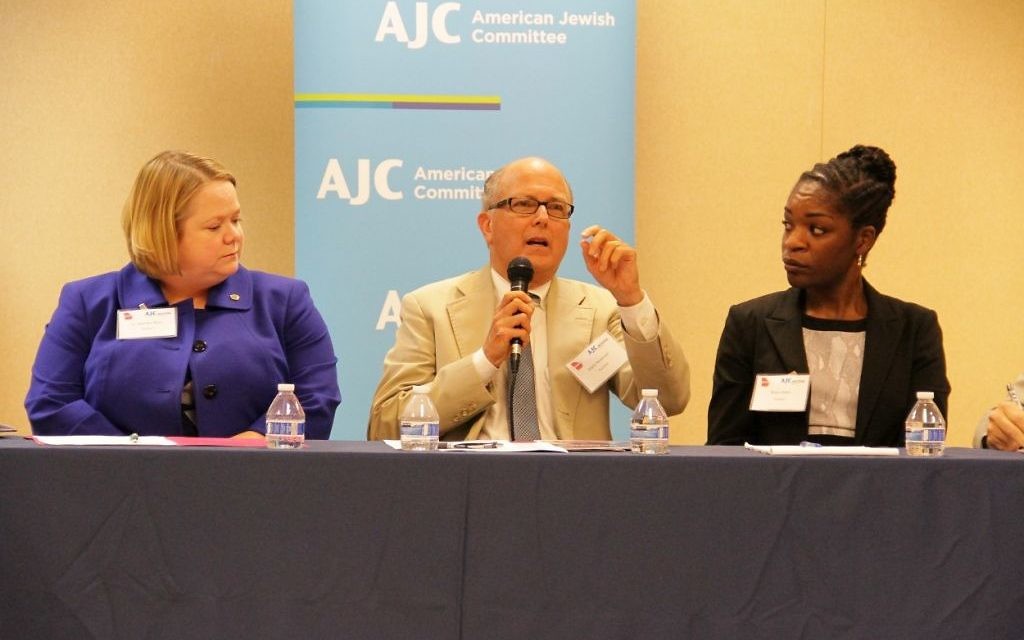Justice, Justice, Minorities Still Seek
By Kevin Madigan / kmadigan@atljewishtimes.com

How does the criminal justice system affect minority groups? That was the question raised during a panel discussion Thursday, Aug. 27, hosted by the American Jewish Committee’s ACCESS young professionals group and the Georgia Association of Latino Elected Officials.
According to The New York Times, 1,000 people have been killed by police officers since the events in Ferguson, Mo., slightly more than a year ago, many of them from minority groups. “That gives you an idea of the scope of what we face,” said moderator Kent Alexander, a former AJC president.
Get The AJT Newsletter by email and never miss our top stories Free Sign Up
One problem is criminal representation, he said. “If you’re indigent and you don’t have money, you don’t have rights. It’s hard to believe.”
Panelist Ilham Askia, a co-founder of defense reform organization Gideon’s Promise, has devoted her career to defending those rights. “What would have happened to those individuals had they survived? They would have been arrested, processed and probably given a public defender,” Askia said. “Yes, those deaths are tragic, but there are tens of thousands being arrested every day. What happens after they’re arrested? We never talk about that conveyor belt, that processing of people, but think about the lives that are losing their liberties in the system.”
Decatur police Lt. Jennifer Ross echoed that concern. “It’s a like a hamster wheel, or you’re in the drive-through lane for fast food. It’s like speed dating. You get five minutes to meet the client in the hallway, and then you rush into court.”
Ross wants to hire additional police officers and have more training for them. “We need more people to step up and do this job for the right reasons,” she said. Students interested in becoming cops are hesitant to do so because of the shift work involved, or because they’re starting a family, or because of the low pay.
“We need changes in how police departments operate, in training, in budgets,” she said, adding that not all expectations can be met. “We are not the Band-Aids for every social problem. That has come from social change. We can’t moderate every neighborhood dispute, but there is a benefit to mediating between people rather than arresting them. We are learning de-escalation techniques so services can be provided instead of incarceration.”
Mental health plays a part as well. Askia said one in three of her clients suffers from some form of mental illness. “We provide a holistic representation for the whole client. Can we find them services, medication? Are they going to lose their housing? Where can we place them?”
She derided the lack of funding available and said the government is good at being reactive but not proactive. Gideon’s Promise is looking for ways to support people with mental health and substance abuse issues and for defenders and defendants to understand the collateral consequences of taking a plea.
“We need counselors to help convince our clients to get the help they need, and from whom,” Askia said.
Georgia House Minority Leader Stacey Abrams (D-Atlanta) said Medicaid expansion would go a long way toward addressing the mental health problems by expanding health coverage to uninsured minorities. The federal Affordable Care Act gave states the option to expand Medicaid at federal expense for several years, with the states gradually picking up a small percentage of the cost. Georgia opted against the expansion.
“Every person in this room is represented by a state legislator. Demanding Medicaid expansion is not a partisan issue,” Abrams said.
Immigration lawyer Mark Newman, who has a Cuban mother, said the national media misrepresent Hispanics in criminal reporting. “When you follow these incidents in the media, what gets much more play is those situations where the Hispanic is the perpetrator. There is very little coverage involving Hispanic victims. You see more sensational stories, particularly about the undocumented.”
Abrams said the legislature should do more to fix problems in the system, but the public needs to step up and speak out. “Politicians are like 15-year-old girls: We respond to money, peer pressure and attention,” she said. “Until we are held accountable, the issues don’t change. It’s like what happened in Ferguson, where more than 100 bills were filed following Michael Brown’s murder, but only two of them made it through the legislature. That’s because even though people were very unhappy and righteously indignant, they did not hold the legislature accountable for making the necessary changes.”





comments